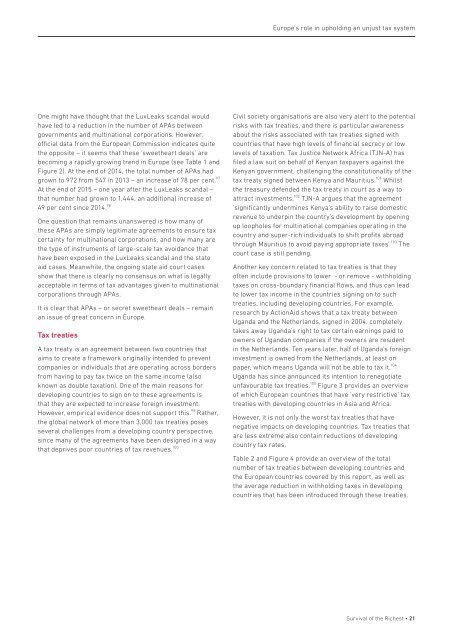Create successful ePaper yourself
Turn your PDF publications into a flip-book with our unique Google optimized e-Paper software.
Europe's role in upholding an unjust tax system<br />
One might have thought that <strong>the</strong> LuxLeaks scandal would<br />
have led to a reduction in <strong>the</strong> number <strong>of</strong> APAs between<br />
governments and multinational corporations. However,<br />
<strong>of</strong>ficial data from <strong>the</strong> European Commission indicates quite<br />
<strong>the</strong> opposite – it seems that <strong>the</strong>se ‘swee<strong>the</strong>art deals’ are<br />
becoming a rapidly growing trend in Europe (see Table 1 and<br />
Figure 2). At <strong>the</strong> end <strong>of</strong> 2014, <strong>the</strong> total number <strong>of</strong> APAs had<br />
grown to 972 from 547 in 2013 – an increase <strong>of</strong> 78 per cent. 97<br />
At <strong>the</strong> end <strong>of</strong> 2015 – one year after <strong>the</strong> LuxLeaks scandal –<br />
that number had grown to 1,444, an additional increase <strong>of</strong><br />
49 per cent since 2014. 98<br />
One question that remains unanswered is how many <strong>of</strong><br />
<strong>the</strong>se APAs are simply legitimate agreements to ensure tax<br />
certainty for multinational corporations, and how many are<br />
<strong>the</strong> type <strong>of</strong> instruments <strong>of</strong> large-scale tax avoidance that<br />
have been exposed in <strong>the</strong> LuxLeaks scandal and <strong>the</strong> state<br />
aid cases. Meanwhile, <strong>the</strong> ongoing state aid court cases<br />
show that <strong>the</strong>re is clearly no consensus on what is legally<br />
acceptable in terms <strong>of</strong> tax advantages given to multinational<br />
corporations through APAs.<br />
It is clear that APAs – or secret swee<strong>the</strong>art deals – remain<br />
an issue <strong>of</strong> great concern in Europe.<br />
Tax treaties<br />
A tax treaty is an agreement between two countries that<br />
aims to create a framework originally intended to prevent<br />
companies or individuals that are operating across borders<br />
from having to pay tax twice on <strong>the</strong> same income (also<br />
known as double taxation). One <strong>of</strong> <strong>the</strong> main reasons for<br />
developing countries to sign on to <strong>the</strong>se agreements is<br />
that <strong>the</strong>y are expected to increase foreign investment.<br />
However, empirical evidence does not support this. 99 Ra<strong>the</strong>r,<br />
<strong>the</strong> global network <strong>of</strong> more than 3,000 tax treaties poses<br />
several challenges from a developing country perspective,<br />
since many <strong>of</strong> <strong>the</strong> agreements have been designed in a way<br />
that deprives poor countries <strong>of</strong> tax revenues. 100<br />
Civil society organisations are also very alert to <strong>the</strong> potential<br />
risks with tax treaties, and <strong>the</strong>re is particular awareness<br />
about <strong>the</strong> risks associated with tax treaties signed with<br />
countries that have high levels <strong>of</strong> financial secrecy or low<br />
levels <strong>of</strong> taxation. Tax Justice Network Africa (TJN-A) has<br />
filed a law suit on behalf <strong>of</strong> Kenyan taxpayers against <strong>the</strong><br />
Kenyan government, challenging <strong>the</strong> constitutionality <strong>of</strong> <strong>the</strong><br />
tax treaty signed between Kenya and Mauritius. 101 Whilst<br />
<strong>the</strong> treasury defended <strong>the</strong> tax treaty in court as a way to<br />
attract investments, 102 TJN-A argues that <strong>the</strong> agreement<br />
‘significantly undermines Kenya’s ability to raise domestic<br />
revenue to underpin <strong>the</strong> country’s development by opening<br />
up loopholes for multinational companies operating in <strong>the</strong><br />
country and super-rich individuals to shift pr<strong>of</strong>its abroad<br />
through Mauritius to avoid paying appropriate taxes’. 103 The<br />
court case is still pending.<br />
Ano<strong>the</strong>r key concern related to tax treaties is that <strong>the</strong>y<br />
<strong>of</strong>ten include provisions to lower - or remove - withholding<br />
taxes on cross-boundary financial flows, and thus can lead<br />
to lower tax income in <strong>the</strong> countries signing on to such<br />
treaties, including developing countries. For example,<br />
research by ActionAid shows that a tax treaty between<br />
Uganda and <strong>the</strong> Ne<strong>the</strong>rlands, signed in 2004, completely<br />
takes away Uganda’s right to tax certain earnings paid to<br />
owners <strong>of</strong> Ugandan companies if <strong>the</strong> owners are resident<br />
in <strong>the</strong> Ne<strong>the</strong>rlands. Ten years later, half <strong>of</strong> Uganda’s foreign<br />
investment is owned from <strong>the</strong> Ne<strong>the</strong>rlands, at least on<br />
paper, which means Uganda will not be able to tax it. 104<br />
Uganda has since announced its intention to renegotiate<br />
unfavourable tax treaties. 105 Figure 3 provides an overview<br />
<strong>of</strong> which European countries that have ‘very restrictive’ tax<br />
treaties with developing countries in Asia and Africa.<br />
However, it is not only <strong>the</strong> worst tax treaties that have<br />
negative impacts on developing countries. Tax treaties that<br />
are less extreme also contain reductions <strong>of</strong> developing<br />
country tax rates.<br />
Table 2 and Figure 4 provide an overview <strong>of</strong> <strong>the</strong> total<br />
number <strong>of</strong> tax treaties between developing countries and<br />
<strong>the</strong> European countries covered by this report, as well as<br />
<strong>the</strong> average reduction in withholding taxes in developing<br />
countries that has been introduced through <strong>the</strong>se treaties.<br />
<strong>Survival</strong> <strong>of</strong> <strong>the</strong> <strong>Richest</strong> • 21


